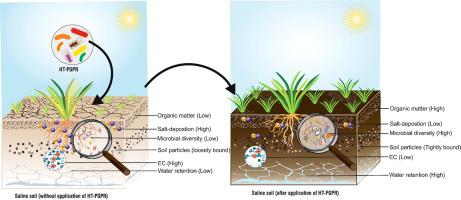Journal of Advanced Research ( IF 11.4 ) Pub Date : 2020-07-11 , DOI: 10.1016/j.jare.2020.07.003 Naveen Kumar Arora 1 , Tahmish Fatima 2 , Jitendra Mishra 3 , Isha Mishra 2 , Sushma Verma 2 , Renu Verma 2 , Maya Verma 4 , Ankita Bhattacharya 1 , Priyanka Verma 1 , Priya Mishra 1 , Chanda Bharti 1

|
Background
The collective impact of climate change and soil salinity is continuously increasing the degraded lands across the globe, bringing agricultural productivity and food security under stress. The high concentration of salts in saline soils impose osmotic, ionic, oxidative and water stress in plants. Biological solutions can be the most reliable and sustainable approach to ensure food security and limit the use of agro-chemicals.
Aim of Review
Halo-tolerant plant growth promoting rhizobacteria (HT-PGPR) are emerging as efficient biological tools to mitigate the toxic effects of high salt concentrations and improve the growth of plants, simultaneously remediating the degraded saline soils. The review explains the role of HT-PGPR in mitigating the salinity stress in plants through diverse mechanisms and concurrently leading to improvement of soil quality.
Key Scientific Concepts of Review
HT-PGPR are involved in alleviating the salinity stress in plants through a number of mechanisms evoking multipronged physiological, biochemical and molecular responses. These include changes in expression of defense-related proteins, exopolysaccharides synthesis, activation of antioxidant machinery, accumulation of osmolytes, maintaining the Na+ kinetics and improving the levels of phytohormones and nutrient uptake in plants. The modification of signaling by HT-PGPR inoculation under stress conditions elicits induced systemic resistance in plants which further prepares them against salinity stress. The role of microbial-mechanisms in remediating the saline soil through structural and compositional improvements is also important. Development of novel bioinoculants for saline soils based on the concepts presented in the review can be a sustainable approach in improving productivity of affected agro-ecosystems and simultaneously remediating them.
中文翻译:

耐卤植物促进根际细菌生长以提高盐渍土的生产力和修复
背景
气候变化和土壤盐分的共同影响正在不断加剧全球土地退化,给农业生产力和粮食安全带来压力。盐渍土中高浓度的盐分对植物造成渗透、离子、氧化和水分胁迫。生物解决方案可能是确保粮食安全和限制农用化学品使用的最可靠和可持续的方法。
审查目的
耐卤植物生长促进根际细菌 (HT-PGPR) 正在成为一种有效的生物工具,可以减轻高盐浓度的毒性作用并改善植物的生长,同时修复退化的盐渍土。该综述解释了 HT-PGPR 通过多种机制减轻植物盐分胁迫并同时改善土壤质量的作用。
审查的关键科学概念
HT-PGPR 通过多种机制参与减轻植物的盐分胁迫,引发多方面的生理、生化和分子反应。这些包括防御相关蛋白表达的变化、胞外多糖合成、抗氧化机制的激活、渗透物的积累、维持 Na +动力学和提高植物中植物激素和养分吸收的水平。在胁迫条件下通过接种 HT-PGPR 对信号转导的修饰在植物中引发了诱导的系统抗性,这进一步使它们准备好抵御盐胁迫。微生物机制在通过结构和成分改善来修复盐渍土中的作用也很重要。基于审查中提出的概念开发用于盐碱地的新型生物接种剂可能是提高受影响农业生态系统生产力并同时对其进行修复的可持续方法。











































 京公网安备 11010802027423号
京公网安备 11010802027423号